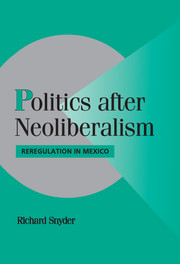Crossref Citations
This Book has been
cited by the following publications. This list is generated based on data provided by Crossref.
Snyder, Richard
2001.
Scaling Down: The Subnational Comparative Method.
Studies in Comparative International Development,
Vol. 36,
Issue. 1,
p.
93.
Hagopian, Frances
and
Mainwaring, Scott P.
2001.
The Third Wave of Democratization in Latin America.
Mahoney, James
and
Rueschemeyer, Dietrich
2003.
Comparative Historical Analysis in the Social Sciences.
p.
3.
Boone, Catherine
2003.
Political Topographies of the African State.
Kurtz, Marcus J.
2004.
The Dilemmas of Democracy in the Open Economy: Lessons from Latin America.
World Politics,
Vol. 56,
Issue. 2,
p.
262.
Beer, Caroline
and
Mitchell, Neil J.
2004.
Democracy and Human Rights in the Mexican States: Elections or Social Capital?.
International Studies Quarterly,
Vol. 48,
Issue. 2,
p.
293.
Mutebi, Alex M
2004.
Recentralising while Decentralising: Centre-Local Relations and “CEO” Governors in Thailand.
Asia Pacific Journal of Public Administration,
Vol. 26,
Issue. 1,
p.
33.
Schneider, Ben Ross
2004.
Business Politics and the State in Twentieth-Century Latin America.
Kurtz, Marcus J.
2004.
Free Market Democracy and the Chilean and Mexican Countryside.
Frazier, Mark W.
2004.
After pension reform: Navigating the “Third Rail” in China.
Studies in Comparative International Development,
Vol. 39,
Issue. 2,
p.
45.
Martin, Patricia M
2005.
Comparative Topographies of Neoliberalism in Mexico.
Environment and Planning A: Economy and Space,
Vol. 37,
Issue. 2,
p.
203.
Gibson, Edward L.
2005.
Boundary Control: Subnational Authoritarianism in Democratic Countries.
World Politics,
Vol. 58,
Issue. 1,
p.
101.
HIRA, ANIL
HUXTABLE, DAVID
and
LEGER, ALEXANDRE
2005.
Deregulation and Participation: An International Survey of Participation in Electricity Regulation.
Governance,
Vol. 18,
Issue. 1,
p.
53.
Hiskey, Jonathan T.
and
Bowler, Shaun
2005.
Local Context and Democratization in Mexico.
American Journal of Political Science,
Vol. 49,
Issue. 1,
p.
57.
Sellers, Jefferey M.
2005.
Re-Placing the Nation.
Urban Affairs Review,
Vol. 40,
Issue. 4,
p.
419.
McDermott, Gerald A.
2005.
The Politics of Institutional Renovation & Economic Upgrading: Lessons from the Argentine Wine Industry.
SSRN Electronic Journal,
Liverman, Diana M.
and
Vilas, Silvina
2006.
Neoliberalism and the Environment in Latin America.
Annual Review of Environment and Resources,
Vol. 31,
Issue. 1,
p.
327.
EAKIN, HALLIE
TUCKER, CATHERINE
and
CASTELLANOS, EDWIN
2006.
Responding to the coffee crisis: a pilot study of farmers’ adaptations in Mexico, Guatemala and Honduras.
The Geographical Journal,
Vol. 172,
Issue. 2,
p.
156.
Drope, Jeffrey
2006.
Don’t buy from me Argentina: Politics, economics, and trade liberalization in Argentina, 1992–2001.
Studies in Comparative International Development,
Vol. 41,
Issue. 1,
p.
53.
2007.
Intimate Enemies.
p.
3.





